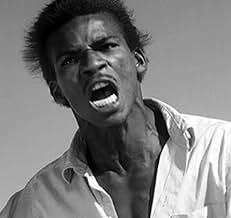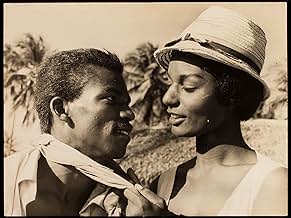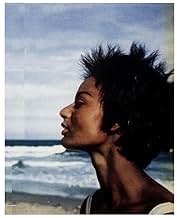Nello stato di Bahia, Brasile, un acculturato uomo nero ritorna nel suo villaggio di nascita per tentare di liberarlo dai miti e dalla religione, da lui considerati fattori di oppressione po... Leggi tuttoNello stato di Bahia, Brasile, un acculturato uomo nero ritorna nel suo villaggio di nascita per tentare di liberarlo dai miti e dalla religione, da lui considerati fattori di oppressione politica e sociale.Nello stato di Bahia, Brasile, un acculturato uomo nero ritorna nel suo villaggio di nascita per tentare di liberarlo dai miti e dalla religione, da lui considerati fattori di oppressione politica e sociale.
- Premi
- 1 candidatura
Antonio Pitanga
- Firmino
- (as Antonio Sampaio)
Trama
Lo sapevi?
- ConnessioniEdited into A Edição do Nordeste (2023)
Recensione in evidenza
Okay this is from the time that New Wave was sweeping European festival screens, the time Marxism was sweeping Latin American politics. The French at the time were looking into the intricacies of self, the notations that modern self splinters into. This works on another plane.
It is primarily centered on ritual, it offers a ritualized take of the struggles of life.
There is first the fishing, the joy of collective work. The place is a small fishing community off the coast of Bahia, untouched by modernity, nothing but ocean and palm trees, a place where slaves were unloaded time ago and all that has really changed generations later is that they are loaned a ramshackle fishing net by a merchant to go fishing with for the reward of keeping some of the fish for themselves.
They have kept the dances, one of them is samba, something that must have evolved from slave songs, it bears the call and response format, it sublimates hardship. Another ritual here. Gathered in a circle in the open air, old and young take turns entering the circle and doing a small dance, nothing elaborate, sloppy even, purely for the joy of airing the body, letting the toil pour itself out from the hips and limbs.
A third ritual. They have kept the magical belief from Africa, santeria, again the dance, the chanted call and response but now a sea goddess may be listening and has to be appeased. It's here that a muddled sense enters the picture. The samba was simple and exhilarating, it meant itself. Here we stretch to understand that the natives understand deeper forces to be moving their world.
Three rituals, rites that invite passage, that gradually introduce different facets of the forces that move this world.
A narrative is shaped behind these rituals. It's about a radical who has been to the city and back and urges the natives to throw the bonds of oppression. This is the typical Marxist message. In Soviet films he would have been the statuesque hero, bearer of revolution gospel to the oppressed. But this one is a seething scoundrel who plots murder. He berates their voodoo but only after he has tried it himself and the spell didn't work. Religion is seen as superstition, a meandering cycle to appease the sea instead of facing the real cause of worldly suffering.
A sense of powerful metaphysics begins to cloud the film. The notion is that there are no gods that move here, only the movements of ignorant mind groping with the horizon. The result is uncanny. Where we try to read metaphor into these cinematic flows of the sea, there's nothing. There's only their belief, their woe and confusion that creates these flows, no meaning outside what they are. This is no Stromboli; no Tempestaire; but cinematic space equally reveals inmost self.
So, why have this agitated man mouth off about revolution and not a more noble representative? Why tangle us and confuse instead of clearly present conflict? Because it may be a way of saying that if you hope to awaken people, you'll have to get tangled up in their world, and that doing this falls on people as confused and unenlightened.
Rocha works a powerful double perspective. The Marxist hero as another ignorant being, ignorance as the loss of self into ritualized perceptions, into emotional turbulence we create. And the whole is filmed out of sympathy for the oppressed from inside their elliptical world so that we lose the superficial certainty of the cause and message.
It's a powerful exercise on ignorance. It works - we leave it muddle- minded and uncertain ourselves.
This filmmaker, Rocha, his political leanings are unmistakable, but he's not complacent like Godard, he does not take easy shots. Even in this early film, he mulls over the difficulties, he leaves unreflective room; the radicalist's plot works but it's at the back of conniving and death. It pays off with more intimate, more personal value in Terra em Transe.
It is primarily centered on ritual, it offers a ritualized take of the struggles of life.
There is first the fishing, the joy of collective work. The place is a small fishing community off the coast of Bahia, untouched by modernity, nothing but ocean and palm trees, a place where slaves were unloaded time ago and all that has really changed generations later is that they are loaned a ramshackle fishing net by a merchant to go fishing with for the reward of keeping some of the fish for themselves.
They have kept the dances, one of them is samba, something that must have evolved from slave songs, it bears the call and response format, it sublimates hardship. Another ritual here. Gathered in a circle in the open air, old and young take turns entering the circle and doing a small dance, nothing elaborate, sloppy even, purely for the joy of airing the body, letting the toil pour itself out from the hips and limbs.
A third ritual. They have kept the magical belief from Africa, santeria, again the dance, the chanted call and response but now a sea goddess may be listening and has to be appeased. It's here that a muddled sense enters the picture. The samba was simple and exhilarating, it meant itself. Here we stretch to understand that the natives understand deeper forces to be moving their world.
Three rituals, rites that invite passage, that gradually introduce different facets of the forces that move this world.
A narrative is shaped behind these rituals. It's about a radical who has been to the city and back and urges the natives to throw the bonds of oppression. This is the typical Marxist message. In Soviet films he would have been the statuesque hero, bearer of revolution gospel to the oppressed. But this one is a seething scoundrel who plots murder. He berates their voodoo but only after he has tried it himself and the spell didn't work. Religion is seen as superstition, a meandering cycle to appease the sea instead of facing the real cause of worldly suffering.
A sense of powerful metaphysics begins to cloud the film. The notion is that there are no gods that move here, only the movements of ignorant mind groping with the horizon. The result is uncanny. Where we try to read metaphor into these cinematic flows of the sea, there's nothing. There's only their belief, their woe and confusion that creates these flows, no meaning outside what they are. This is no Stromboli; no Tempestaire; but cinematic space equally reveals inmost self.
So, why have this agitated man mouth off about revolution and not a more noble representative? Why tangle us and confuse instead of clearly present conflict? Because it may be a way of saying that if you hope to awaken people, you'll have to get tangled up in their world, and that doing this falls on people as confused and unenlightened.
Rocha works a powerful double perspective. The Marxist hero as another ignorant being, ignorance as the loss of self into ritualized perceptions, into emotional turbulence we create. And the whole is filmed out of sympathy for the oppressed from inside their elliptical world so that we lose the superficial certainty of the cause and message.
It's a powerful exercise on ignorance. It works - we leave it muddle- minded and uncertain ourselves.
This filmmaker, Rocha, his political leanings are unmistakable, but he's not complacent like Godard, he does not take easy shots. Even in this early film, he mulls over the difficulties, he leaves unreflective room; the radicalist's plot works but it's at the back of conniving and death. It pays off with more intimate, more personal value in Terra em Transe.
- chaos-rampant
- 21 lug 2014
- Permalink
I più visti
Accedi per valutare e creare un elenco di titoli salvati per ottenere consigli personalizzati
Dettagli
- Data di uscita
- Paese di origine
- Lingua
- Celebre anche come
- The Turning Wind
- Azienda produttrice
- Vedi altri crediti dell’azienda su IMDbPro
- Tempo di esecuzione1 ora 18 minuti
- Colore
- Mix di suoni
- Proporzioni
- 1.37 : 1
Contribuisci a questa pagina
Suggerisci una modifica o aggiungi i contenuti mancanti

Divario superiore
By what name was Barravento (1962) officially released in India in English?
Rispondi

















